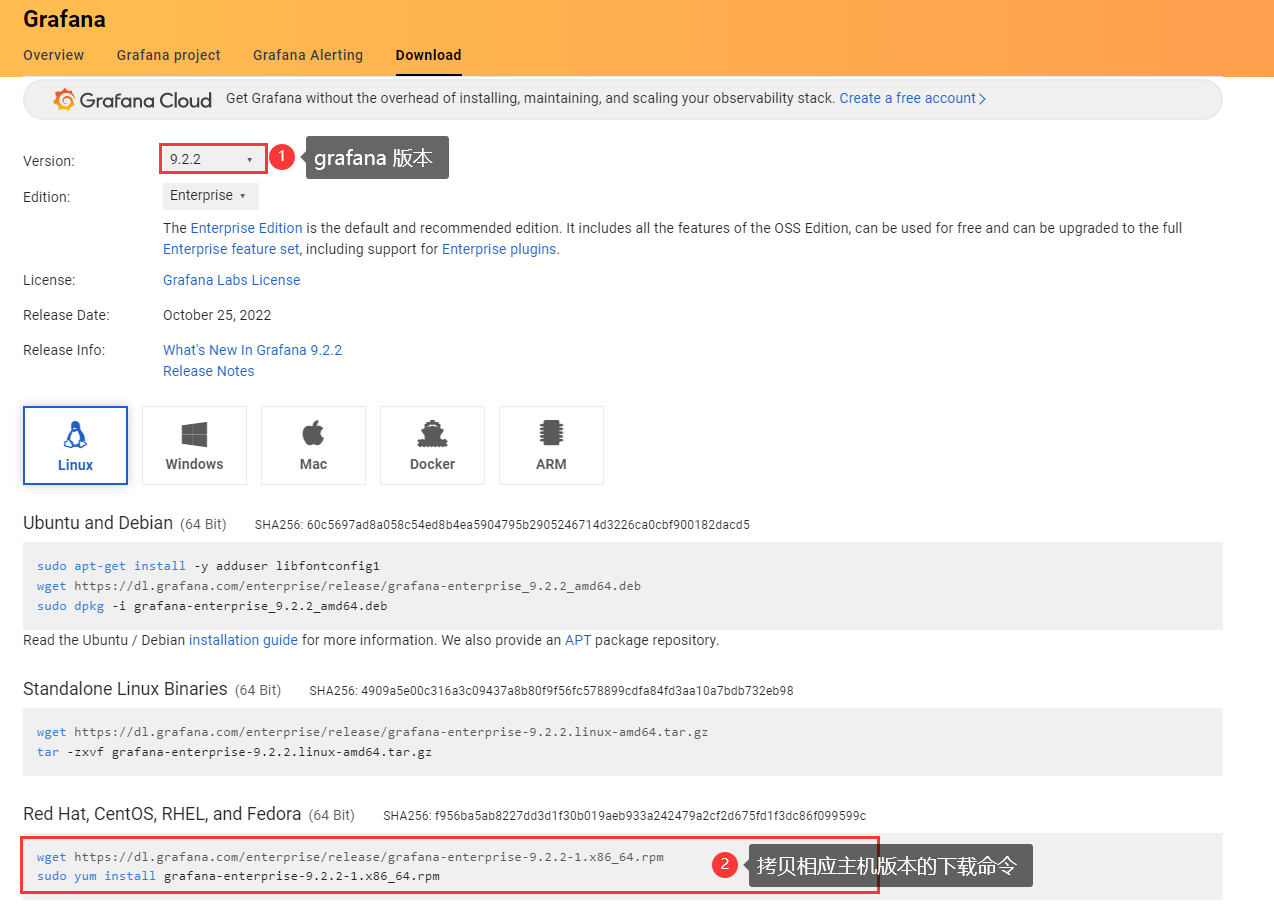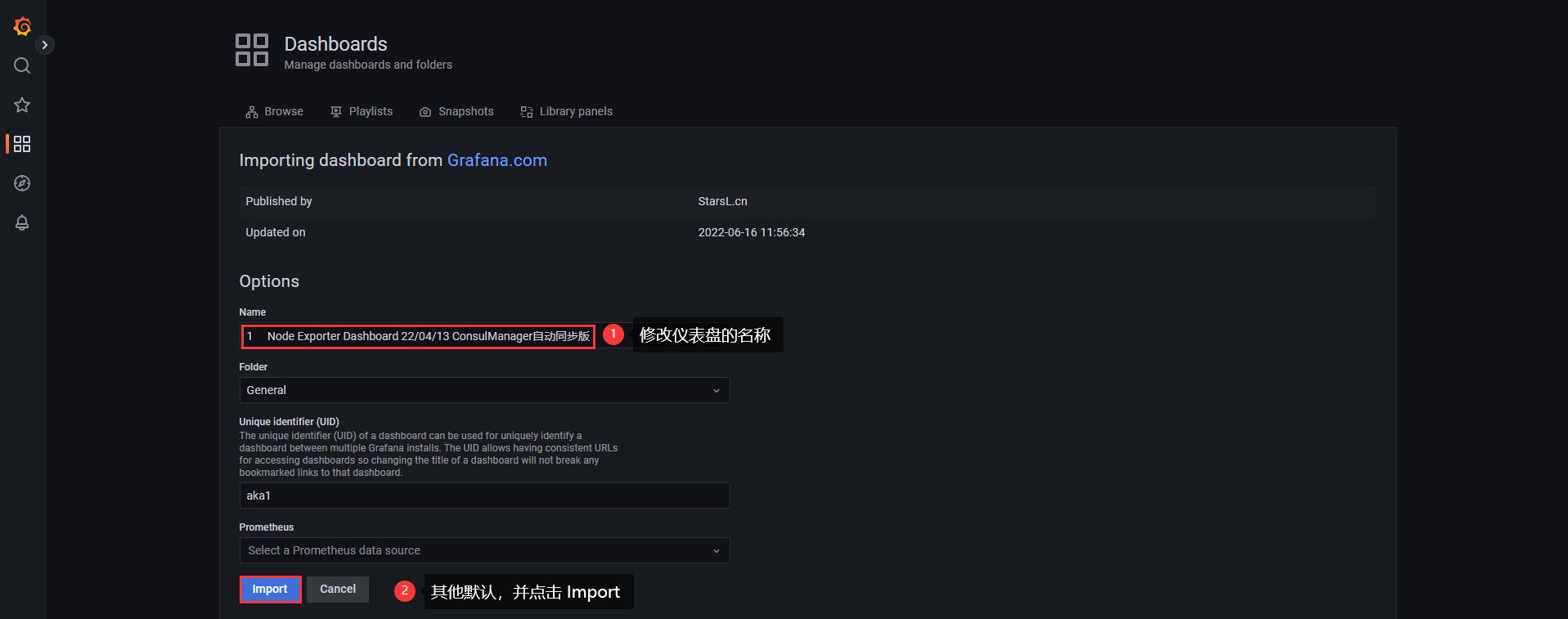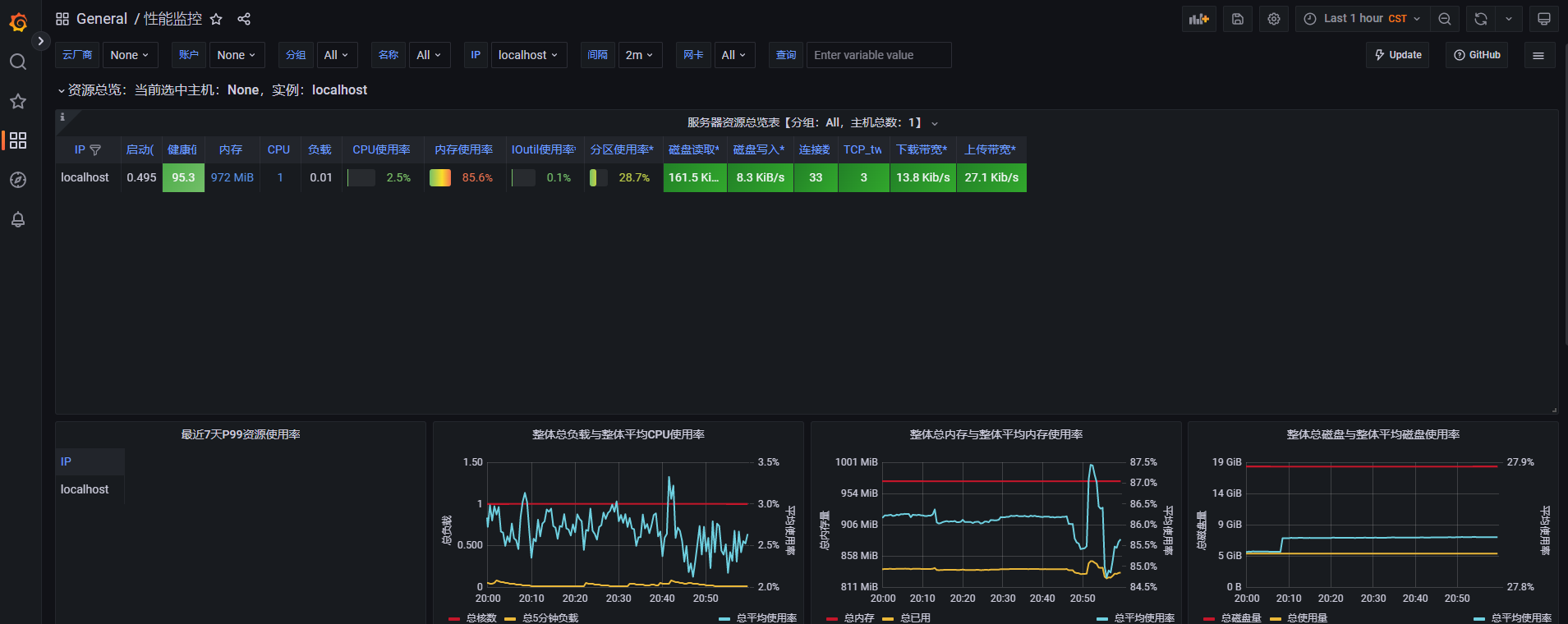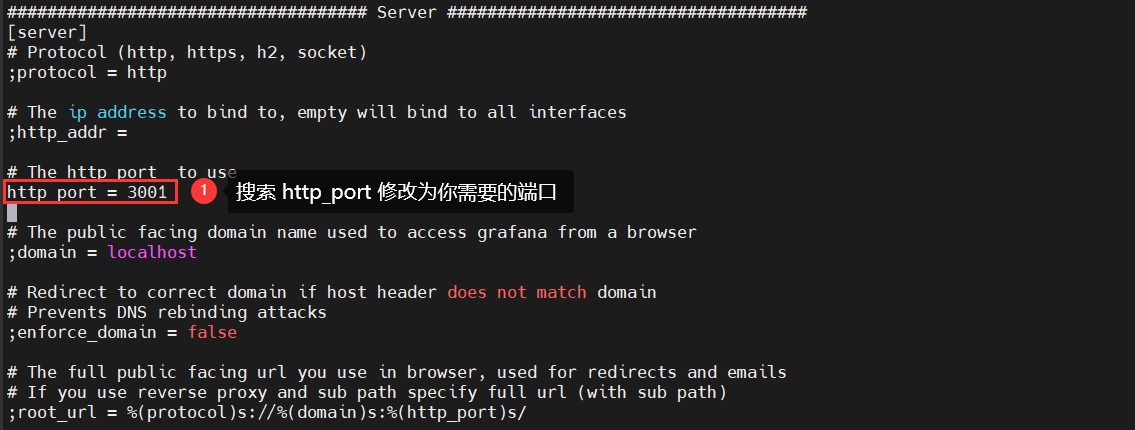我们在做性能测试的时候,经常需要通过各种命令去查看服务器的资源情况,由于关注的内容较多,所以也挺麻烦的。对运维来说,也需要一款工具能随时监控线上服务器的各项指标。
通过 Prometheus + Grafana 就可以搭建出一套监控平台。
个人网站
17test.cn同步更新
Prometheus
Prometheus 是由谷歌研发的一款开源的监控软件。
Prometheus 是一款基于时序数据库的开源监控告警系统,通过安装在远程机器上的 exporter 收集数据并通过HTTP协议从远程的机器上获取数据,最后存储在本地的时序数据库上。
Node exporter 是 Prometheus 最常用的一种 exporter,主要负责收集 Linux 的 /proc 以及 /sys 目录下的系统文件获取操作系统运行状态。
另外还有一些其他的 exporter 分别用来监控不同的应用程序:
reids exporter:通过Reids命令行获取指标mysql exporter:通过读取数据库监控表获取MySQL的性能数据
这些获取到的监控数据,再通过 Grafana 实现可视化、图形化、图表化的信息展示。
这样,我们在做性能测试、生产服务器监控的时候,就不用 Linux 命令,而且更直观。
本篇文章演示如何在一台 Centos 服务器上部署 Prometheus。
部署 Prometheus + Grafana
在 Centos 上部署 Prometheus + Grafana 包含以下 3 个大的步骤:
- 安装 Prometheus,并部署成服务
- 安装 Node exporter, 并部署成服务
- 安装 Grafana
安装 Prometheus
创建 Prometheus 用户
$ useradd -m -s /bin/false prometheus
创建配置目录
$ mkdir /etc/prometheus
$ mkdir /var/lib/prometheus
$ chown prometheus:prometheus /var/lib/prometheus/
下载最新版的 prometheus
-
通过 wget 命令下载
# 切换到home目录,将文件下载在这里 $ cd ~ # 如果没有 wget 命令则先安装 $ dnf install wget -y # 如果已经有了 wget 命令 $ wget https://github.com/prometheus/prometheus/releases/download/v2.39.1/prometheus-2.39.1.linux-amd64.tar.gz
由于文章存在时效性,如果你要下最新的,请直接前往Prometheus 下载
-
你也可以直接下载 linux 版本
链接:https://pan.baidu.com/s/1SIipv7igCfYoMWtmHJX8jA?pwd=iccg
提取码:iccg? 通过 sftp 上传到 Centos。推荐使用 mobaxterm作为 SSH 客户端远程连接,非常方便。
解压文件
$ tar -zxpvf prometheus-2.39.1.linux-amd64.tar.gz
# 复制 prometheus 和 promtool 到 /usr/local/bin 路径
$ cd prometheus-2.39.1.linux-amd64
$ cp prometheus /usr/local/bin
$ cp promtool /usr/local/bin
# 将 prometheus.yml 复制到 /etc/prometheus/ 路径
$ cp prometheus.yml /etc/prometheus/
开放 Prometheus 端口
$ firewall-cmd --add-port=9090/tcp --permanent
$ firewall-cmd --reload
创建 Prometheus 服务
创建服务文件,以便以服务方式运行 Prometheus
$ vi /etc/systemd/system/prometheus.service
将下面的内容拷贝进去
[Unit]
Description=Prometheus Time Series Collection and Processing Server
Wants=network-online.target
After=network-online.target
[Service]
User=prometheus
Group=prometheus
Type=simple
ExecStart=/usr/local/bin/prometheus \
--config.file /etc/prometheus/prometheus.yml \
--storage.tsdb.path /var/lib/prometheus/ \
--web.console.templates=/etc/prometheus/consoles \
--web.console.libraries=/etc/prometheus/console_libraries
[Install]
WantedBy=multi-user.target
注意检查一下开头和结束的内容,拷贝可能会造成内容丢失。
启动服务
# 重新加载
$ systemctl daemon-reload
# 启动 Prometheus 服务
$ systemctl start prometheus
# 设置 Prometheus 开机启动
$ systemctl enable prometheus
# 验证 Prometheu s正在运行
$ systemctl status prometheus
# 查看端口 9090
netstat -tunlp |grep 9090
在浏览器打开 http://server-ip:9090, server-ip 改为你 centos 的 ip。你将会看到如下界面。

安装 Node Exporter
node exoorter 用于收集 linux 系统的 CPU、内存、网络等信息。
创建用户
$ useradd -m -s /bin/false node_exporter
下载解压
- 下载
$ wget https://github.com/prometheus/node_exporter/releases/download/v1.4.0/node_exporter-1.4.0.linux-amd64.tar.gz
{% note warning flat %}
由于文章存在时效性,需要最新版本,请前往node exoorter 下载
{% endnote %}
- 解压并复制到
/usr/local/bin
$ tar -zxpvf node_exporter-1.4.0.linux-amd64.tar.gz
# 复制到 /usr/local/bin
$ cp node_exporter-1.4.0.linux-amd64/node_exporter /usr/local/bin
# 修改目录权限
$ chown node_exporter:node_exporter /usr/local/bin/node_exporter
以服务方式运行
创建 service 配置文件
$ vi /etc/systemd/system/node_exporter.service
复制以下内容
[Unit]
Description=Prometheus Node Exporter
Wants=network-online.target
After=network-online.target
[Service]
User=node_exporter
Group=node_exporter
Type=simple
ExecStart=/usr/local/bin/node_exporter
[Install]
WantedBy=multi-user.target
注意检查一下开头和结束的内容,拷贝可能会造成内容丢失。
启动服务
# 重新加载
$ systemctl daemon-reload
# 启动 Prometheus 服务
$ systemctl start node_exporter
# 设置 Prometheus 开机启动
$ systemctl enable node_exporter
# 验证 Prometheu s正在运行
$ systemctl status node_exporter
# 查看端口 9090
$ netstat -tunlp |grep 9100
开放 9100 端口
$ firewall-cmd --add-port=9100/tcp --permanent
$ firewall-cmd --reload
修改 Prometheus 配置,加入 node_exporter
$ vi /etc/prometheus/prometheus.yml
添加如下内容
- job_name: 'node_exporter'
static_configs:
- targets: ['localhost:9100']
完整的 prometheus.yml:
# Global config
global:
scrape_interval: 15s # Set the scrape interval to every 15 seconds. Default is every 1 minute.
evaluation_interval: 15s # Evaluate rules every 15 seconds. The default is every 1 minute.
scrape_timeout: 15s # scrape_timeout is set to the global default (10s).
# A scrape configuration containing exactly one endpoint to scrape:
# Here it's Prometheus itself.
scrape_configs:
# The job name is added as a label `job=<job_name>` to any timeseries scraped from this config.
- job_name: 'prometheus'
# metrics_path defaults to '/metrics'
# scheme defaults to 'http'.
static_configs:
- targets: ['localhost:9090']
- job_name: 'node_exporter'
static_configs:
- targets: ['localhost:9100']
重启 Prometheus 服务
$ systemctl restart prometheus
在浏览器打开http://server-ip:9100/metrics,会看到如下界面:

安装 Grafana
下载安装
进入 Grafana 的 [下载页面](Download Grafana | Grafana Labs)
选择你的服务器版本:

这里我们选择 CentOS 的命令:
$ wget https://dl.grafana.com/enterprise/release/grafana-enterprise-9.2.2-1.x86_64.rpm
$ sudo yum install grafana-enterprise-9.2.2-1.x86_64.rpm
启动 Grafana 服务
# 启动 Grafana 服务
$ systemctl start grafana-server
# 设为开机启动
$ systemctl enable grafana-server
开放3000端口
$ firewall-cmd --add-port=3000/tcp --permanent
$ firewall-cmd --reload
访问地址 访问地址:http://server-ip:3000
默认的账号密码是 admin/admin

配置 Prometheus
进入 Grafana 后,添加数据源:




配置显示模板



最终就能看到配置后的结果。

后续进入的话,可以从菜单>Dashboards进入:

附录:问题
如何修改 Grafana 的默认端口
如果你已经部署了其他程序,占用了3000端口,那么你可能需要修改一下 Grafana的 默认端口。
- 修改 Grafana 的配置文件
$ vi /etc/grafana/grafana.ini

- 保存退出后,重新启动 Grafana 服务:
$ systemctl start grafana-server
Prometheus没有数据
按照步骤安装之后,发现 Prometheus 没有数据,大概率是服务器时间设置问题。
查看服务器上的日期:
$ timedatectl

如果服务器时间与你手机的时间不一致,则需要同步一下时间:
# ntp 同步时间
$ ntpdate ntp1.aliyun.com
# 如果 ntpdate 命令不存在,需要安装一下
$ yum install ntp
查看 Grafana 中 Prometheus 配置的时间:


如果你已经是 Asia/Shanghai就不需要修改。确保 Prometheus 的时区与服务器的时区一致,且时间是正确的。